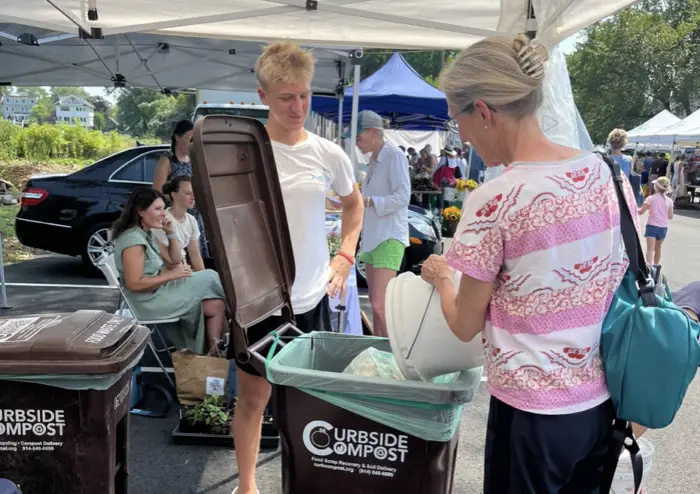
The town of Greenwich’s municipal food scrap recycling program surpassed a significant milestone with more than a half million pounds of organic materials collected. This voluntary, drop-off program diverts household food waste from the trash and converts it to nutrient-rich compost, rather than incinerating the organic material as trash, a polluting and costly process.
A collaboration between Greenwich Public Works, Waste Free Greenwich and Greenwich Green & Clean, the initiative was conceived by a group of community volunteers, who were inspired to address the state’s growing waste crisis and combat the negative public health, environmental and budgetary impacts of the current waste management system. Initial funding was raised through a Sustainable Connecticut Community Match challenge, with the support of generous residents.
First Selectman Fred Camillo, an early proponent of the program, recognizes the success of this public-private partnership, noting, “Reaching the milestone of over 500,000 pounds of food scrap recycled in the past four years is something we are all very proud of here in our town. Our community has come a long way, and with the strong efforts and leadership of our volunteers in Waste Free Greenwich, the Greenwich Sustainability Committee, GRAB and Greenwich Green & Clean, we will continue toward our goal to reduce waste and make Greenwich the greenest town in Connecticut.“
Since the ribbon cutting in June 2020, the drop site at the Holly Hill Resource Recovery Facility has received nearly 311,000 pounds of food scraps. The Holly Hill staff heroically got the program off the ground at the start of the pandemic and continues to maintain this busy location. The initiative has since grown beyond the transfer station with satellite collections established in Old Greenwich and Round Hill. The
nonprofit Waste Free Greenwich manages the drop site at the Old Greenwich Farmer’s Market on Wednesdays from 2:30 to 6 pm. During the off season, its volunteers continue to operate the site at Living Hope Community Church from noon to 2 p.m. More than 150,000 pounds of organics have been collected over the past three years.
Backcountry boasts its own drop site at Round Hill Community Church, which is maintained by church members as part of the Episcopal Church’s Creation Care initiative. Approximately 44,000 pounds of organic materials have been collected. Volunteers at both sites supervise drop offs to ensure a low contamination rate, educate residents about the program and sell composting starter kits that make the process easier. Curbside Compost hauls the collected material from all locations to New Milford Farms to be converted into compost.
Connecticut’s waste management system is at a critical point due the closure of the Hartford incinerator and aging waste infrastructure. Currently, 40% of waste is taken out of state to be burned or buried, and costs to residents and municipalities are projected to rise exponentially. “Food scrap recycling is the low-hanging fruit, the most promising solution to our waste crisis,” explained Julie DesChamps, chair of Waste Free Greenwich. “Wasted food makes up almost a quarter of our waste stream. We’re off to a good start, but with more participation in the municipal program, greater investment in infrastructure and expanded educational programming, we can right the ship. We’re excited about the future possibilities.”




















